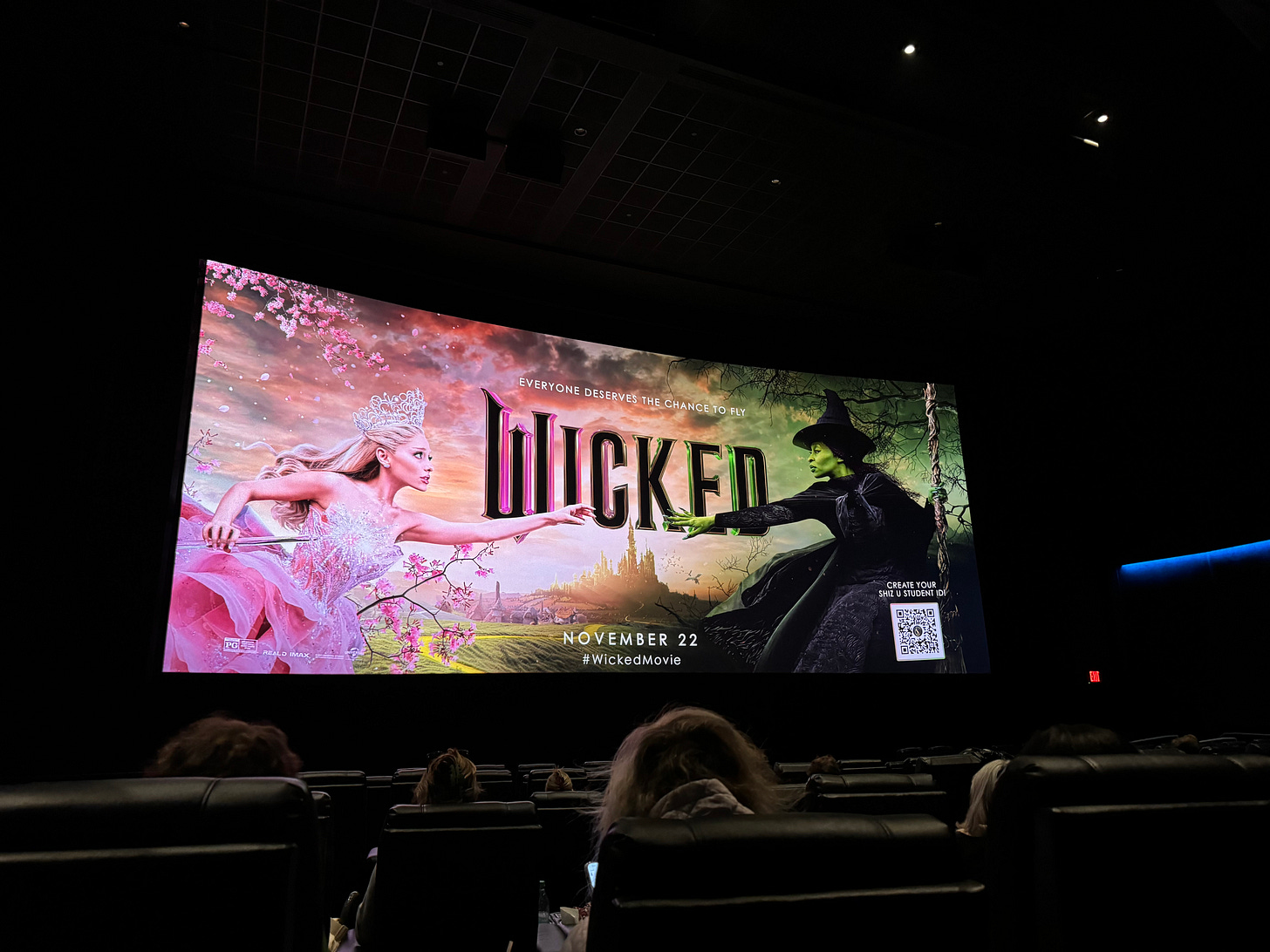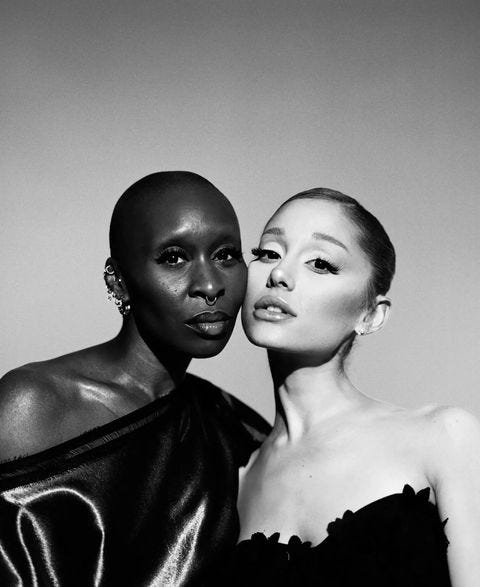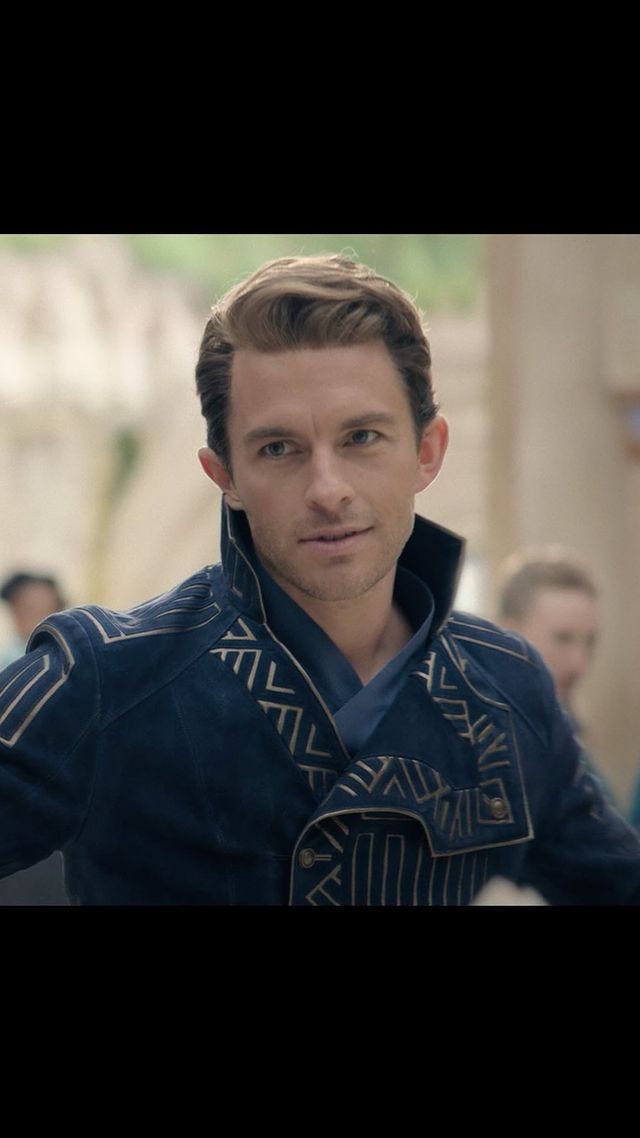'Wicked' and The Cost Of Black Girl Magic ✨
My experience while sitting in the theatre, and what will follow me after.
It was a Sunday morning, and I was up early. I didn’t quite plan to sleep in, but I didn’t think I’d be so bright-eyed and bushy-tailed, either. Yet there I was, at 8:16 am, in my long-sleeved, ankle-length floral green Madewell dress, ready. I wore it when I saw Wicked on Broadway at the Gershwin Theatre for the first time. And I would wear it to a different kind of theatre today.
I had seen Wicked many times, in musical theatre form. I grew up a theatre kid, my first play in the sixth grade. The first song I’d ever heard from the show was “Popular,” when my good friend Madeline practiced it with me ahead of her performing arts school audition for Annie. I became obsessed with it, as one does when someone in middle school is introduced to something new that opens up a world for them and they make it their whole personality. I later made a YouTube video (that I now can’t locate, ahem, for the better) acting out the song with a wand and a crown in a white t-shirt and jeans.
I slowly became interested in the rest of the soundtrack. There’s the “Defying Gravity” divas and the “What Is This Feeling?” warriors, but I developed an immediate fixation on “I’m Not That Girl.” Junior year, when my senior theatre friends were graduating and we sent them off, we all sang “For Good” at their goodbye banquet and cried. When I met my husband, Dan, one of the early things I learned about him was that his family listened to the Wicked soundtrack on road trips and that he knew the words to most of the songs. It said so much about him to me, and I remember becoming even more smitten in that moment. I originally saw the show Off-Broadway in my hometown when it traveled to Chrysler Hall. I saw it again with Dan and his family a few months after we got engaged, on Broadway, in that green dress.
The film looked incredible out the gate. So incredible, that as the camera hovered over mystical poppy fields and rovered through the villages surrounding the Emerald City, I started crying. I was completely overtaken by emotion, and it hadn’t even been a full two minutes yet. “This is a record,” Dan smiled. I cried again when we first saw Ariana Grande float down as Glinda. When she began singing, I cried for the third time. It wasn’t even 10 minutes in!
In a therapy session this week while talking about my mom, my therapist asked, “If your tears could talk, what would they say?” I thought for a moment. I figured, first, that they were sad, or scared; scared that I’ll never be as selfless or wonderful of a mother as my mom’s been to me. “Are they joyful?” she asked. I paused again. “Yes,” I realized. “They are.” Happy tears. Happy that I have her as my mother. Happy because of how lucky I am.
When I saw Grande descend, I asked myself the same thing. I’ve followed the singer through her career, us being one year apart in age. I remember watching her religiously on the Nickelodeon show, Victorious, and then her YouTube videos; particularly her belting “Teenage Dream” and then me recording myself on Photo Booth trying to do the same (read: 🤡). I moved on from her when she moved on from Nickelodeon, and didn’t really consider myself a follower of hers again until her album thank u, next. But when she sang that first note on screen, I cried for that little girl on Victorious and belting “Teenage Dream.” When she came down from the clouds in that gorgeous pink gown designed by the queer, Black designer, Paul Tazewell, I cried for him and for the young woman who many people might not know debuted on Broadway in 13 at the age of 14. And when the camera whizzed over Oz, I cried for myself; middle school me who found beauty, meaning, and community in theatre — and in Wicked — over fifteen years ago. They were happy tears, too.
The film adaptation was already soaring. When the phenomenal Cynthia Erivo entered as Elphaba, however, I did not cry. I beamed. I grinned without restraint as she hopped over rocks, singing about someone — an elder — recognizing her potential excellence. I wore my toothiest smile as she ran gleefully through a golden field at full speed. “You’re green,” Glinda noted out loud in the scene before. “I am,” Erivo returns, executed excellently with a nuanced note of sarcastic epiphany — and unrealized pride.
It’s embarrassing to say, but all those years of adoring Wicked and seeing it on stage, I never connected the dots about the implications of Elphaba’s skin color. Don’t laugh. I know it’s obvious. She’s fucking green, lol. But in my head, she was just “different.” Any person who has ever felt othered could largely relate to this character, and it wasn’t strictly about the color of her skin. Perhaps that was because underneath, I knew it was a beautiful white woman; Idina Menzel or Talia Suskauer or anyone else who has graced the role. Playing the outsider.
I had a feeling after seeing the first trailer that the film would be more obviously about Elphaba’s skin tone in a more grounded yet apparent way. The film struck the balance perfectly. It’s the way Glinda talks about the color of Elphaba’s skin being an “issue” she could help with (as if the “issue” was the color of Elphaba’s skin, and not Glinda’s own complex or reaction towards it). It’s the way Bowen Yang’s Pfannee grabs Glinda’s arm and says I don’t see color as he walks away from Elphaba. It’s the way Elphaba’s frustration with not being valued or listened to or simply respected over and over again manifests as magic, only to be seen as “angry” or “feisty” by people who already hate her anyways. Naturally, as the movie transfigured, so did my tears. Unlimited. And yet.
It was all familiar. Glinda’s performative act of “solidarity” when she renames herself in front of a crowd to honor Peter Dinklage’s Dr. Dillamond (as a goat, of course, he couldn’t pronounce her name with the same ease humans could) after he was taken into captivity — and everyone applauding her. Jonathan Bailey’s Fiyero and his “dancing through life” attitude, because he can, as opposed to many of his classmates. Michelle Yeoh’s Madame Morrible and her support for Elphaba, until Elphaba disagrees with her based on her own true lived experience. Some of you might even be doing it now. (“You’re just making this about race.” In the words of Elphaba, my friend, “I am!” :))))))
Glinda, centering herself. (Blue bracelets to tell the world you’re a “safe person,” anyone?) Fiyero, “dancing through life” more easily because he is able-bodied, straight, white, wealthy, hot. (And, ya know, can always take a break from the fight and opt back in, as he chooses.) Madame Morrible, a “good person,” so her beliefs can’t be wrong, right? (The political agenda to cage animals for being, well, animals, subs reeeal nicely as a metaphor for real life humans.)
The familiar parallels of allyship and prejudice and assimilation in my own life suddenly wouldn’t stop revealing themselves to me. The way Glinda comforted Elphaba in an extremely meaningful way by telling her just because it’s her secret doesn’t mean it’s her fault one moment, then trying to adjust Elphaba’s appearance and behavior to be more fitting for her the next. (The “Popular” scene delivered, by the way.) The way Glinda noticed (not asked, which I love) that Elphaba was “trembling” and proactively put a cape around her to keep her warm, yet ran after Elphaba trying to convince her that she should apologize and that she misunderstood their intentions and that she was “not as powerful as she thought” up until the very end.
I even think about the moment Glinda and Elphaba become friends, and wonder if Glinda’s first actual true display of kindness was because of what Elphaba had done for her first (tell her professor she wouldn’t continue lessons with her until Glinda was allowed to join), or if it was a selfish act of wanting to feel what Elphaba had spent a lifetime learning to do, and was also so good at: being free despite what other people think of her. Glinda is not the villain. But she is whiteness, at its best and its worst, personified.
It dawned on me in the theatre while singing “I’m Not That Girl” under my breath as Elphaba wandered through the glow of the woods after her and Fiyero almost kissed and he fled back Glinda. The reason I developed an immediate fixation upon hearing the song as a preteen is because it was my entire life. It was growing up in a suburban beach town, often as one of the only Black girls in my classes, and then ending up at a PWI because they had the media program I wanted to enroll in. It was liking boys I was surrounded by who often didn’t look like me, hands touch, eyes meet, sudden silence, sudden heat, hearts leap in a giddy whirl — knowing, like, deeply knowing — that he felt what I was feeling. Chemistry. But the optics of being with a Black girl? Not great. (“My grandmother is racist,” one of them once told me, “so I can’t.”)
Every single time, I convinced myself into thinking they never actually liked me in the first place, only to find out directly from them that their feelings were very real months or years later — from the safety of time or distance or another relationship. He could be that boy. But I'm not that girl. In this song, I could lose myself in lyrics that truly understood. Gold hair with a gentle curl. That's the girl he chose. And Heaven knows. I'm not that girl.
The film didn’t have to say a word. I understood it in my bones.
During the OzDust Ball, Glinda joins Elphaba in the middle of the floor so she is not alone. Rather than run back out of the ballroom after being mocked, Elphaba had decided to dance by herself. And because of Glinda, she no longer had to dance on her own. I cried for the fourth time.
“If your tears could talk, what would they say?” These tears were more complex. I understood so deeply the relief and joy of someone recognizing your struggle, and offering their presence or empathy or advocacy. Just this week, a friend stood up for me after noticing I was the only Black woman in a certain space and was being expected to do more than others, only to be scoffed at when I called it out. I called her afterwards, tearing up with thanks, her not even realizing how much her speaking up meant to me. It is nice not to be alone. Elphaba didn’t want to be alone, either, even though she was good at it.
The tears that streamed down Erivo’s face in this scene were tears that none of the other Elphabas1 could cry because only one of them could truly understand. Yes, they were tears of relief and joy. But it was finally letting out years — years — of pent up pain. True, excruciating pain. From being mocked, from being the butt of the joke, from being made fun of, from being bullied, from being a punching bag, from being made a spectacle, from being the elephant in the room, from being othered.
When the caged lion cub is brought into the classroom after Dr. Dillamond is taken away, the keeper tells the class that the animal is glad to be there. Elphaba asks, Then why is he trembling? He’s scared. Then near the end, right before Elphaba flies to her escape after being deemed a threat to all of Oz, Glinda notices something about her. You’re trembling, she tells Elphaba. I still don’t know whether Elphaba was actually cold — or if she was scared, like the lion cub. What really concerns me, though, is that I don’t know if the possibility of Elphaba being scared for her life even registered with Glinda.
The biggest thing I didn’t know walking into this film, but that I now do, is that I needed to see a Black Elphaba for it to all make sense. I thought back to all the times in my life I was cast out from personal settings or vilified in professional settings after speaking truth to power. I thought about the times I was used for my magic, then discarded. I thought about the continued and sometimes lonesome weight of fighting for the freedom of all living creatures. Like Elphaba. Unlimited. And yet. Judged. Scorned. Exiled.
As Erivo’s groundbreaking rendition of “Defying Gravity” swelled, I didn’t even realize I was weeping. Like, weeping. Not just because it was beautiful and moving and all of the award-worthy, insanely incredible things it most definitely was. But because I was weeping for myself as a little girl; all she has endured. It was almost like the director Jon M. Chu knew, because when I looked up through my tears, grown up Elphaba was looking at little Elphaba, and she reached for herself in the reflection.
When the film ended, I asked myself again what my final set of tears could say if they could talk. They were the tears Elphaba shed on the dance floor. Relief. Pain. Joy. Our tears as Black women never mean just one thing. And most times, it’s not really beautiful or moving. It’s lonely.
It wasn’t until I was on the subway on the way home that I realized: this version of the story, unlike the stage musical, starts and ends with Elphaba. We are unlimited. And we don’t want theatrics; we simply want to be listened to.
Thanks for reading In Deep with Mia Brabham Nolan! Subscribe to receive all new posts, or become a paid subscriber to help support my time and work (and pay my incredible editor, Rebecca). All silly little opinions are my own.
Leave a comment! What did you think of Wicked? What was your favorite part? Who are you going to see it with, or would you want to see it with? I want to hear from you!
Before Cynthia Erivo, there was never a Black actress who played Elphaba full-time on Broadway. In the London West End, Alexia Khadime is the only Black woman to have played Elphaba full-time.







Stunning essay - thank you for sharing!
Thank you so much for sharing this. Beautifully expressed.